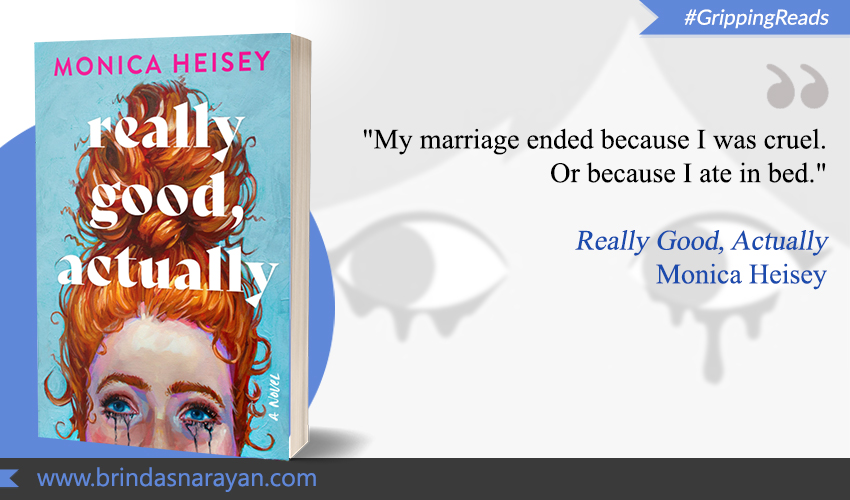
A Funny, Bittersweet Slant on Divorce
Couples fall in love for mysterious, ineffable reasons. We often hear that awkwardly suspended phrase – “What does she see in –?” or “How could they –?”, the pauses flashing with surprise and disapproval. But if the reasons for coupledom are hard to fathom, perhaps the opposite – reasons for breakups or divorces – are easier to pin down. Writing from a point-of-view of a recent divorcee in her hilarious novel, Really Good, Actually, Monica Heisey suggests that it’s trickier to pare down the laundry list of complaints.
After all, at that point, it might feel like the relationship was shattered by anything and everything. Broadly speaking, there are the “me” (her) reasons and the “he” reasons. Like “because red wine makes me critical…Or because I was clingy at parties.” “Or because he forgot our anniversary once.” Ricocheting between the seemingly trivial and serious, this is a time when minor misdemeanors assume whalelike proportions.
Fortunately for Maggie, on the very next morning after he moves out, with a cat, three guitars and a gaming system, she resolves to make the most of her loss. Maybe snap up a selfie that could form part of a narrative exhibit when she turns 80. (Incidentally, she’s 29, at this point.)
His moving out is a relief in other ways. It’s better than his waffling, his recently persistent threats chaining her down. But they had been together for nearly ten years, having paired up at 19. And they hadn’t seen the breakup coming, till it washed up on their shores like a spring tide. Theirs was a storybook romance, friends at college, then lovers, then housemates (or apartment mates) till marriage seemed commonsensical.
Despite Maggie’s irony and humor, or attempts to find the silver lining, the emotions are raw: “The first morning without him, I swear to god, I woke up crying.” Soon well-meaning friends and colleagues chime in with suggestions. The ideas might well be the results of a typical Google search that any modern would engage in.
But friends don’t leave Maggie to Google’s smarts. They recommend therapy, or online dating, or new hobbies. Quite a few come up with Kintsugi – the Japanese art of repairing broken pottery. It’s the philosophy they’re probably getting at, the art of incorporating breaks or scars into one’s personal history. To tint the cracks with gold, to revel in their jagged artistry.
Written in the attention-addled, mood-swinging voice of many millennials, whose compulsive google-searching or doom-scrolling can be both cathartic and damaging, the book is a testimony to contemporary minds. To ways in which we can inhabit our agonizing selves and simultaneously do the opposite – like a self watching a self taking a selfie. Alternating between real despair and witty sarcasms, Really Good, Actually is also a commentary about the internet age. Skewering low-rise jeans as much as capitalism, we can relate to the manner in which abstract forces impinge on private lives.
There’s also this: beneath the veneer of sparkling social media selves, the old-fashioned emotions haven’t changed. Breakups can be as fraught, loneliness as dispiriting. Grief, even if transmuted into Insta-updates or Fb posts, takes time to wash out. This is a debut novel, but Heisey has already proven her writing chops as a screenwriter for Schitt’s Creek. Though she was personally divorced at the same age as her protagonist, she denies that the book was based on her experience. And honestly that’s immaterial to the work. This is a book that many can relate with – divorced or otherwise – since surely you haven’t lived long enough, if you haven’t faced any kind of loss. The work might inspire you to turn it into material for a standup comedy, a screenplay or your own debut novel.
References
Monica Heisey, Really Good, Actually, William Morrow (Harper Collins), USA, 2023




